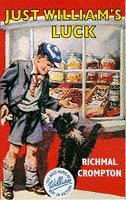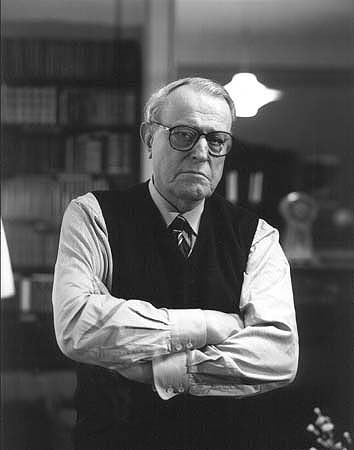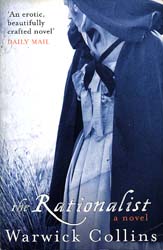Saturday 29 September 2007
Friday 28 September 2007
ground control to Major Tom

Men In Space by Tom McCarthy
In Tom McCarthy's first novel Remainder everything stems from 'something falling from the sky'. What it is that falls we are not told beyond the fact that it was 'Technology. Parts, bits'. This is because one of the conditions of the compensation package which leaves our protagonist £8.5 million richer is that he doesn't discuss 'the incident' which has left his memory impaired. Bold and atmospheric, packed full of images and ideas Remainder was my favourite book of last year, of many years in fact, it was a book which really excited me. It was also great to see a book initially published by a very small outfit (Metronome Press, Paris) go on to achieve critical success and further publishing deals here and abroad.
McCarthy's next novel thrusts in the other direction with things ascending into the sky. Above a fragmenting Europe a Soviet cosmonaut is stranded in orbit. With the Soviet Union breaking up 'like pool balls separating on the break' there is no state prepared to pay for his journey home. Set in Europe during the fall of Communism and the splitting up of Czechoslovakia the novel is populated by artists, criminals, the police and an Englishman abroad; Nick, who is based loosely around McCarthy himself. All of these rootless characters are floating around Europe like the other man in space. Remainder was narrated with a clear, almost clinical tone but this novel is filled with a myriad of competing voices and the start of the novel is a little like tuning in a radio.
Part of the plot involves a stolen icon painting which is to be copied by an artist, Ivan Manásek. There is something 'wrong' with this particular picture, the signs and symbols so rigidly adhered to by the icon painters of history seem to have been played with and the saint that is ascending into an ellipse serves as another strong visual metaphor. The scene where Manásek actually makes his copies is a fantastic piece of writing, vividly creating the fervour and attention to detail of the artist at work. In fact the novel is filled with good writing. The party scenes are well written by McCarthy who was living in Prague at the time of the creation of the Czech Republic. And elsewhere the prose is again heavy with visual imagery and metaphors, which like the signs and symbols of the icon painting feel loaded with import and meaning.
Deciphering that meaning is the tricky part and the problem with this book is that there are too many strands, too many unfulfilled characters to make a satisfying whole. McCarthy admits that Men In Space 'started as a series of disjointed, semi-autobiographical sketches written in what seems like another era, and grew into one long, disjointed document from which a plot of sorts emerged from time to time to sniff the air before going to ground again'. The book confirms that McCarthy is a writer to watch and to take seriously but it will probably be the next novel proper which gives us an idea of what he is capable of.
Wednesday 26 September 2007
Morgan M
So, yesterday was my second wedding anniversary. Each year my wife and I like to treat ourselves to something a bit special in the gastronomic arena. No shortage of choices in London of course, in fact the problem is usually whittling the list down to something comprehensible. This year we decided to go French and not too far from home. After a little Internet searching last year I had come across a place in Islington called Morgan M. The reviews I read tended to veer between those who had stumbled across it and had a lovely time and those that had gone in search of something special and come away very disappointed.
Well, we had a lovely evening. The restaurant was nice and quiet so we were well looked after, the staff were attentive without being oppressive. The menu is either 'A La Carte' or there is a six course Summer Menu option with which you can have a selection of wines to suit each course. As much as we would have loved to have done that my wife is 8 months pregnant so the wine was never going to be an option and with a choice of foie gras and raw tuna making up one of the courses we went for the A La Carte option.
Before we started we were brought an appetiser of chilled beetroot puree with a white foam which tasted of a blue cheese, an interesting combination which got the taste buds warmed up for what would follow. I started with a ravioli of snails (when in Rome and all that) which was great and it was gazpacho (pictured above) for my wife which she really enjoyed. She plumped for monk fish with asparagus and a lobster froth for her main and I went for rabbit with Israeli couscous which was good in a posh/rustic kind of way. Our puddings were actually preceded by a tiny vanilla rice-pudding with passion fruit sorbet (a pudding starter, now this I like), I had gone for a dark chocolate Moelleux with raspberry sorbet which was incredibly light and gorgeous and it was an apricot soufflé for the lady. All of the food was packed with flavour and nothing felt fussy for fussy sake. Yes, there was a lot of foam and froth but it was that kind of lightness which made the meal so enjoyable. Each course was introduced by the waiter in an accent so thick we sometimes wondered whether he'd brought the right thing but hey, we were along for the ride. Our evening was topped off when we got back to our illegally parked car to find no ticket. Perfect. Thanks to all at Morgan M for a lovely evening.
You can visit their website here Read more...
Monday 24 September 2007
Little Miss Sunshine
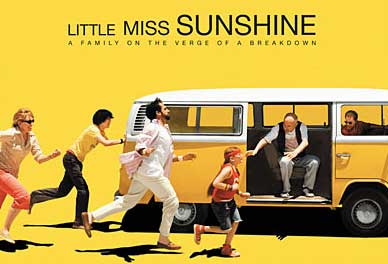
Finally got around to watching this film the other day. Maybe not quite as hilarious as I was expecting but filled with lots of great moments. If you like your comedy black then head down to your local store and rent it now. If only to see Steve Carell's slightly gay running technique.
Sunday 23 September 2007
let's hear it for the boys
 Vince and the boys are back on our screens from Thursday (ITV2 10:30pm) and I don't mind admitting that I'm a very happy bunny. It may not be clever, it may not be pc, but for both of those reasons and the fact that it's damn funny, it most definitely is required viewing. All of the performances are pitch perfect and Jeremy Piven as Ari is sure to hit new heights in this series after the lows he endured at the end of last. Whilst we wait, follow this and enjoy some of his best moments.
Vince and the boys are back on our screens from Thursday (ITV2 10:30pm) and I don't mind admitting that I'm a very happy bunny. It may not be clever, it may not be pc, but for both of those reasons and the fact that it's damn funny, it most definitely is required viewing. All of the performances are pitch perfect and Jeremy Piven as Ari is sure to hit new heights in this series after the lows he endured at the end of last. Whilst we wait, follow this and enjoy some of his best moments.
Interpol
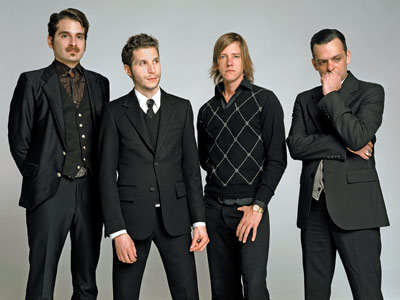
It is difficult to find an article or review of Interpol that doesn't mention Joy Division. It's becoming very boring. Music journalism is filled with talk of influences and I'm never sure whether this is written from a genuine knowledge and love of music or so the writers can show how clever they are and to expose how derivative modern music can be.
At any rate, Interpol are three albums in now and deserve to judged on their own merits. This isn't to say that the band have moved a million miles from their original sound but a listen to their new album shows any Joy Division comparisons to be just a little lazy. Many fans out there are very keen to express what a good band they are live and I was lucky enough to see them in the UK a couple of years back. On an otherwise miserable evening at Crystal Palace watching Coldplay (don't ask) limp through a rain soaked set, Interpol provided excellent support. The fact is they are tight. Cutting a dash in their black suits (or vaguely military uniform in Carlos D's case) they played a perfect set. Each song played with punch, no sloppiness, and the kind of head nodding from the uninitiated that bodes well.
Some of my friends are a little non-plussed. Paul Banks may not have the range of other singers, and yes their music is of a type, but listen to the playing, listen to the depth of sound created by just four men. They have broadened slightly, especially with the new album and the addition of some keyboards. They have certainly developed a more commercially successful sound but listen to the last single Mammoth; that is no softening for the charts. Interpol are a band who have consolidated their position in a music climate which has seen other pioneers of the post-punk success fall by the wayside (The Strokes anyone?). It will be interesting to see where they go next. Not to mention what fashion style Carlos D chooses to resurrect next.
Untitled - from Turn On The Bright Lights
Not Even Jail - from Antics
Mammoth - from Our Love To Admire
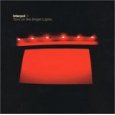

Thursday 20 September 2007
W F Hermans
Sometimes you really do discover a book by chance. Browsing through the stacks at Any Amount of Books one day on Charing Cross Road, looking to satisfy my book buying habit, I picked up a novel. I have no idea why I picked it up, I didn't know the author, hadn't read a review and didn't particularly like the cover, but there was some blurb by J M Coetzee and the sleeve described it as a modern classic of European fiction. Good enough for me that day and thank god I did because it introduced me to the man above Willem Frederik Hermans.
Born in Amsterdam in 1921 Hermans studied physical geography before becoming a lecturer at Gronigen University. In 1972 he was accused of using his time at the university for his own writing rather than lecturing and a committee was set up to investigate. It's main conclusion was that Hermans had used university stationary for his notes. Disaffected with academia and his native country he resigned and moved to Paris in 1973. There he wrote numerous novels, plays, poems and essays including one piece Onder professoren (Among Professors) written entirely on the backs of letters from his university. In order, as his alter-ego Zomerplaag puts it, 'to do something useful with this expensive paper that would normally disappear unread in the garbage bin polluting the environment'. Afterwards the university obliged staff members to use both sides of papers. He died in 1995.
Beyond Sleep is the story of Alfred Issendorf, a young Dutch geologist determined to make a great discovery and win himself fame.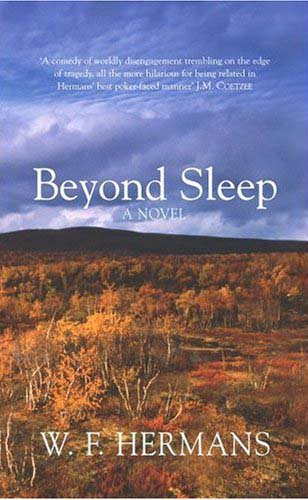 He joins an expedition to Norway hoping to find meteorite craters but it isn't long before his shortcomings put a strain on the group. As the expedition progresses and Alfred is beset by fresh trials and tribulations, he becomes paranoid and desperate. As his mind begins to unravel we see a man pushed to the very limits of endurance. Issendorf is a fantastic creation, imbued with the kind of delusional vanity which made Ignatius J. Reilly so hilarious in A Confederacy of Dunces. Hermans is brilliant at writing the slow disintegration of his mind, the haunting presence of his insecurities and the fragility of his hold on reality.
He joins an expedition to Norway hoping to find meteorite craters but it isn't long before his shortcomings put a strain on the group. As the expedition progresses and Alfred is beset by fresh trials and tribulations, he becomes paranoid and desperate. As his mind begins to unravel we see a man pushed to the very limits of endurance. Issendorf is a fantastic creation, imbued with the kind of delusional vanity which made Ignatius J. Reilly so hilarious in A Confederacy of Dunces. Hermans is brilliant at writing the slow disintegration of his mind, the haunting presence of his insecurities and the fragility of his hold on reality.
The Darkroom of Damocles is very different in tone but no less existential. 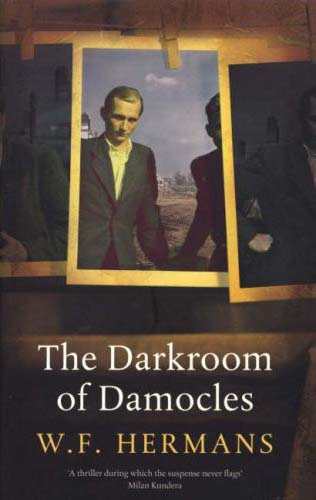 Set during the German occupation of Holland this is a wartime thriller with an ambiguous hero. Henri Osewoudt, a tobacconist, is visited one day by Dorbeck, a man who is Osewoudt's double but in reverse. Henri is blond and beardless with a high voice; Dorbeck is dark haired, his voice deep. Given a series of dangerous missions by Dorbeck, Osewoudt finds himself embroiled in wartime resistance and on the run after his wife denounces him to the Germans. At the end of the war he is taken for a traitor and finds himself unable to prove the existence of his handler Dorbeck. Even the photo he took of the two of them together turns out to be blank. Initially disappointed by this novel, after having enjoyed Beyond Sleep so much, I found myself increasingly caught up in it and surprised by how brave and modern the ending was. It is left for you to decide whether you have been following someone on the 'right' or 'wrong' side.
Set during the German occupation of Holland this is a wartime thriller with an ambiguous hero. Henri Osewoudt, a tobacconist, is visited one day by Dorbeck, a man who is Osewoudt's double but in reverse. Henri is blond and beardless with a high voice; Dorbeck is dark haired, his voice deep. Given a series of dangerous missions by Dorbeck, Osewoudt finds himself embroiled in wartime resistance and on the run after his wife denounces him to the Germans. At the end of the war he is taken for a traitor and finds himself unable to prove the existence of his handler Dorbeck. Even the photo he took of the two of them together turns out to be blank. Initially disappointed by this novel, after having enjoyed Beyond Sleep so much, I found myself increasingly caught up in it and surprised by how brave and modern the ending was. It is left for you to decide whether you have been following someone on the 'right' or 'wrong' side.
These are the only writings of his to have been published in English and I hope others may follow. If, however, they don't then these two novels stand as a great testament to Hermans' skill and deserve to be read by a wider audience.
Tuesday 18 September 2007
family portrait
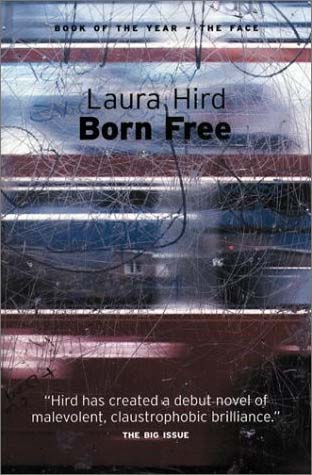
Born Free by Laura Hird
I first came across Laura Hird last year when I was getting all excited about a book that was about to be published called The Raw Shark Texts. Whilst trawling the internet to find out information, following an intriguing web campaign to promote the book and reading the author's (Steven Hall) MySpace page I stumbled upon Laura Hird's fantastic showcase. Filled with poetry, fiction and other work from young writers it was refreshing to read some emerging voices. Laura Hird is a writer in her own right of course and I decided to go back to her debut novel to read her own distinctive voice.
And what a voice it is. Born Free is told by the four members of an ordinary family in Edinburgh. Vic, a bus driver, suffers from impotence which seems to have spread to his ability to deal with his family. Angie is an alcoholic spinning out of control. Joni is approaching her sixteenth birthday and desperate to lose her virginity. And Jake at fourteen just wants to play Fifa '98 and keep as low a profile as possible. Having already been forced to move from their previous flat after Angie's antics turned their neighbours against them, things are not going much smoother in the new tenement. This is a bleak portrait of life in the poorer parts of the city but the narrative voices are acutely individual and filled with that biting perceptive humour which comes from having lived your whole life with the other members of your family.
It needs that kind of humour to leaven the tale of this family's downward spiral. The novel is peppered with one liners and choice phrases. Jake is called to the headmasters office after he and fellow students lock their gym teacher in the store cupboard and chant 'POOF'. Now convinced that the headmaster is gay as well, he is 'sweating with the strain of clenching my bum cheeks by the time he shows me to the door. I always thought he looked a bit like Dale Winton'. Meanwhile, his mother Angie is being interviewed by a policewoman. 'Squeaking her chair back, she stares at the ceiling. In her head she's Helen Mirren, except her chin's not as hairy'.
Both of these illustrate one of the problems with this novel. There are plenty of pop culture references in this book and whilst they may have felt fresh and cutting edge when the book was published almost ten years ago now, they just feel dated and limiting. There is also a limit to the development of the characters. Emotional maturity is not this family's strong suit and so as the novel reaches it end you don't really fell as if any progress has been made. That left me feeling rather bleak personally and I longed for something a little more transcendent, something that would raise this story above the world it inhabits. But I guess that's not the point.
I have been spoilt you see after reading Gerard Wooodward's fantastic trilogy of novels about the Jones Family: August, I'll Go To Bed At Noon and A Curious Earth. This is another dysfunctional family, but the journey of its members and the emotional investment one makes in reading about them make these books a far more rewarding experience.
Sunday 16 September 2007
awakenings
A fervent appetite gripped him, rising beneath his ribs, cold and sharp. Ignoring the knives and silver platter, he raised the leg of lamb to his mouth and, pausing momentarily, tore the meat directly with his teeth...Eating was not so much a pleasure as the evisceration of appetite. As though he had lost his sense of detachment, he now merely gave in to his hunger...he experienced something like a joy in the fleshly things.
It is this that he had feared, precisely this cold appreciation, the Minotaur in himself. He hoped perhaps that a love would one day save him from detachment. But what was proved appeared to be the opposite; that detachment will dissolve all love.
Wednesday 12 September 2007
The Sopranos
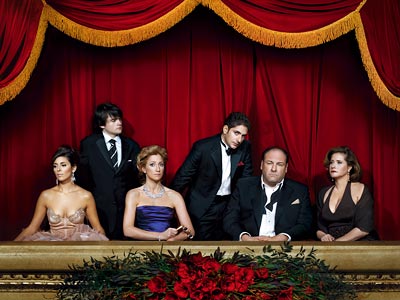 Over the last couple of months I have watched The Sopranos in its entirety. All 86 episodes from the pilot to the controversial ending (which I will not reveal for those still watching) and I am, frankly, shattered. Not only exhausted after the experience of watching almost a decades worth of television on demand, but also now bereft of something truly special. I only wish that I had watched it in 'real time' so as to have really deserved it all, to have earned the right each week to see another instalment rather than simply pressing play every time I fancied another hit like some kind of junkie. Is it the best TV series ever made? Are you watching too much if you start to have Sopranos dreams? Is it suitable viewing for your wife if she's eight months pregnant?
Over the last couple of months I have watched The Sopranos in its entirety. All 86 episodes from the pilot to the controversial ending (which I will not reveal for those still watching) and I am, frankly, shattered. Not only exhausted after the experience of watching almost a decades worth of television on demand, but also now bereft of something truly special. I only wish that I had watched it in 'real time' so as to have really deserved it all, to have earned the right each week to see another instalment rather than simply pressing play every time I fancied another hit like some kind of junkie. Is it the best TV series ever made? Are you watching too much if you start to have Sopranos dreams? Is it suitable viewing for your wife if she's eight months pregnant?
David Chase had originally written a movie script about a mobster in therapy who discovers that his mother wants him whacked. He was persuaded by his agents to show it to broadcasters as his time on Northern Exposure was coming to an end. HBO picked it up and asked him to play the story out over 13 episodes. Chase said he only expected a small cult following but the critics rallied around it and not only did the programme return for another series but it began to influence the medium of television as a whole. Increased budgets, cinematic lighting and effects, but most importantly scripts which continued to push the boundaries of what was acceptable on TV. Not only did this drama place the criminal at the forefront of the action with the police and authorities trying vainly in the background to exert their influence, but the level of violence, profanity, sex, even the haunting images of its dream sequences placed it at the vanguard of a new approach to TV and its audience.
To call The Sopranos a family drama is not just a wry crack. It is all about the relationships between those that consider themselves part of a family unit. Whether that is the immediate members in the Soprano household, the extended members outside of it, those 'cousins', 'nephews' and 'uncles' that orbit around it, the many members of Tony's other 'family' or even the other Italian American characters whose very cultural identity is affected by the exploits of Tony and his crew, all these lives are linked together by the values that hold any family together; honour, loyalty, forgiveness, love. And the strongest of these is love.
The vast mass at the centre of this swirling universe is of course Tony Soprano. One of the amazing things about watching the series in the way I did was that it allowed me to look again at the pilot as soon as the credits had finished rolling on the finale and it is simply staggering to see how James Gandolfini has transformed. Over the seasons the voice has lowered, the stature increased, the girth widened, the breathing laboured. He has steadily grown into the imposing figure at the head of all these families but all along of course there are the fragility's that contradict his simple bulk; the panic attacks that fell him like a tree, the medication that slows him like a drugged elephant, and, later, the gunshot which almost takes him. It is whilst he is in the resultant coma near the start of the final season that you can see what a fine actor he is. A slight change in his accent and bearing and Tony Soprano becomes a different man entirely in this coma/dream world as he works his way back to consciousness and his waiting family. Then you realise what work has gone into creating this iconic character. That we can feel sympathy at all for a man who displays such hatred and violence, especially when it is towards the women in his life, requires huge skill from writers and actor.
And it is the women in his life who do exert such huge influence. As he discusses with Dr Melfi his mother has the power to cause so much damage, to create such turmoil. She is such a poisonous character that my wife and I found ourselves hissing like cats whenever she appeared. Her influence affects his relationships with all women. The gumars, the other women Tony sleeps with or fantasises about, all of them dark haired and surely reminiscent Livia, as difficult as he finds this to accept. Even his feelings for Dr Melfi, as she points out, are part of this pattern. Lorraine Bracco, so brilliant in Goodfellas, plays Dr Melfi with such dignity. That rigid posture in her chair displays so clearly her wish to seem relaxed and in control despite her very real fear of Tony. Through everything she tries and keeps trying to help him, professional at all times even when, after a brutal rape, she knows that she need only ask him and Tony would 'squash' her attacker 'like a bug'. Edie Falco recently said that she was convinced that those watching the programme would see through her and realise that she wasn't a mother in real life. But let's be honest, the family she takes care of is not leading an ordinary life by any standards. The failure of her and Tony to exert discipline over their children is hilarious, and I'm not sure that I've ever watched a programme where I'm willing the woman to commit adultery. It seemed so unfair that whilst Tony was fending off the nubile lovelies who were throwing themselves at him, Carmella was putting herself through the wringer for looking at Furio or that painter chap.
I have always had a soft spot for the two goons Paulie and Silvio. Like two Shakespearean supporting characters they have always been around the action making comments in their own inimitable way (or in Sil's case irresistibly imitable). I don't know how the guitarist from Bruce Springsteen's E Street Band gets cast in a TV drama but it looks to be the most inspired piece of casting since Mos Def turned up as Ford Prefect.And then there's Christopher, Tony's surrogate son. We have watched him rise and fall, rise and fall and all the time that special connection to Tony has been tested to breaking point. The natural heir to the throne?
Character is created jointly by writer and actor and it is important to realise just how good the writing in the Sopranos is. Not only has Chase created a cast of characters that are memorable, individual and idiomatic but also a group of people who continue to surprise. It is amazing to watch a narrative unfold and to find yourself, mouth open in astonishment, dumbstruck at the twist that has just occurred. And I don't mean an 'Ooh, it was them' kind of twist but those moments that happen in life when you don't realise what someone is capable of.
This is not to say that The Sopranos is faultless. There is a period around season 4 where everything slows a little and becomes a bit miserable but the series recovers and the final season is made with such energy, bravery and love that you cannot fail to be in awe of its creators. So, is it the best TV series ever made? Well, best is a rather silly word and I've never been able to do that ordering thing with books or films so let's not go there (but yes it is, probably). Are you watching too much if you start having Sopranos dreams? Undoubtedly. Is it suitable viewing for your wife if she's eight months pregnant? Well, there was no early onset of labour, but she won't mind me telling you that she watched most of the more violent parts from behind her hand.
The Sopranos is essential viewing for anyone who wants to appreciate what television is capable of (and therefore what we should demand from those who make it). Granted, with each episode costing millions of dollars not all TV can look like it, but the quality of writing and acting is something to which all TV should aspire. The only problem is how do I go back to normal television now? What do I watch next? Any suggestions?
Official: swearing is funny
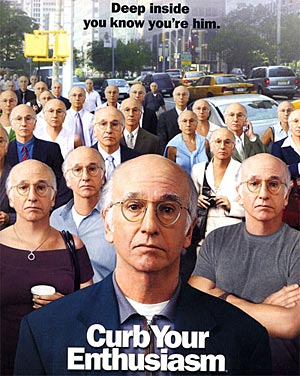
Oh joy. The 6th season of Curb Your Enthusiasm has just begun in the US so only a matter of time before we get to enjoy the continued genius of Larry David. For the uninitiated Curb follows Seinfeld's co-creator Larry David and his inability to live in the modern world without causing a huge ruckus. Imagine a millionaire with no social skills and a grudge and you'll get the idea but nothing can compare to actually watching him put his foot in it again and again. Get a box set, come on it's Christmas coming up, get two. In the meantime enjoy this clip which literally floored me when I watched it. Larry has invested in a restaurant which is having its grand opening. The chef has Tourette's. Larry has recently met a group of students who shaved their heads to support a friend undergoing chemotherapy. Now enjoy the result. WARNING: contains strong language (VERY STRONG).
Tuesday 11 September 2007
storytime
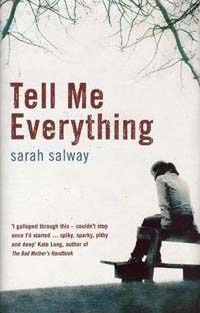
Tell Me Everything
by Sarah Salway
The cover is a worry. It looks like one of those gruesome real-life abuse tales called 'A Stolen Childhood', or 'Please Daddy, Don't' , something provocative like that. And at first it seems that this might be a fictional equivalent. Molly is a young runaway who has left home after creating a scandal at home. One afternoon she finds herself telling a teacher at school about her father, but the story runs away with her and after embellishing the truth she is surprised to see herself taken seriously and the huge consequences it has for her family. So this is not going to be a standard narrative. Molly is telling the tale of her own life and she is not a reliable narrator.
Molly is offered a job and a room by Mr Roberts, the owner of a stationary shop. There is one condition; that whilst she is at the top of the ladder arranging supplies on the top shelf she tell him stories about herself (whilst he peeps up her skirt). She becomes friends with Miranda who works in the salon. As Miranda primps and preens her they flatter one another with compliments about their film-star looks, 'Oh you!' they coo to each other. The local librarian Liz provides Molly with recommendations, starting with romance fantasies and eventually erotica. And then there is Tim, Molly's boyfriend, who seems to be someone very important, possibly even a spy. But as I said this is a novel about the tales we tell ourselves:
People can come from (and go to) nowhere. The homeless Molly Mr Roberts took home with him...was a monster he created himself with every question he asked...And that Molly was now a shared production. Miranda looked after my exterior appearance while, over in the library, Liz and her books were taking care of the inside thoughts. Even I had a part to play, reshaping my memories with every story I told Mr Roberts up that ladder...it was only when I was in the park with Tim that I had to think about being the real Molly.
But even from Tim she hides the past. The question of what really happened at home and the figure of Molly's father have a stalking presence in this novel which unsettles as the plot moves along. Molly is surrounded by people as damaged as her and the character of Tim is particularly unnerving with his tales of being able to 'hear' conversations through walls, his talk of training and missions. It is hardly surprising that Molly should have such a fractured ensemble around her but it is this I think which means the novel just fails to satisfy. There is very little foundation for this collection of tales to stand on. Salway is a prizewinning short story writer and clearly a talented writer. The fragile mental state of Molly is brilliantly evoked by the deluded conviction with which she speaks and the confusion she feels at the gaps in her memory. Where the novel works is as a story about storytelling, the ability we all have to create whatever narrative we need for different people and, in Molly's case, to survive. Like a modern day Scheherazade.
Read more...
Sunday 9 September 2007
William Maxwell

William Maxwell was born in Lincoln, Illinois in 1908 and died in 2000 in New York City where he had lived since the mid 1930's. For forty years he was an editor at The New Yorker where he worked with, amongst others, Eudora Welty, Vladimir Nabokov, John Updike and John Cheever. He wrote six novels, a memoir, two children's books, several story collections as well as essays reviews and letters. He was honoured with many awards including the American Book Award for his final novel So Long, See You Tomorrow. What he also left behind with those who knew or worked with him was the memory of a man who was honourable, generous and also that deceptively simple sounding adjective; good.
I first began reading Maxwell when my father mentioned he was reading a fantastic novel called Time Will Darken It. I got the impression that this novel had spoken directly to him about marriage and its difficulties. In an effort to understand better what he was thinking or going through I bought a copy myself. The title of the novel comes from Francisco Pacheco's 17th century textbook on painting. He advises mixing a bright tint when applying colour, 'It must not be dark; on the contrary, it must be rather on the light side because time will darken it...' and tells the story of Austin King a man whose comfortable life is left damaged after he invites his Southern relatives to stay. It is a wonderful book filled with Maxwell's trademarks; a brilliant observation of family and small town life, characters with their own distinct trajectories and a slowly building emotional punch which hits you hard.
I went on to read much more of his and found that here was a writer who not only knew how to write but was also able to bring into play his skills as an editor. Nowhere is this more obvious than with his final novel So Long, See You Tomorrow. A slim book at 135 pages it contains so much. A man remembers how fifty years ago his friendship with another boy was shattered by a murder in their rural community in Illinois. Richard Ford was left daunted by how it made 'greatness seem simple' and Michael Ondaatje described it as 'one of the great books of our age'. I would urge anyone to read it now. It joins that elite group of small novels which seem perfect (and also one of the few books in history to successfully write, albeit briefly, from the viewpoint of a dog!) .
His other great novel The Folded Leaf also tells the story of two friends; Lymie 'thin and pigeon chested' and Spud the natural athlete who is everything Lymie wants to be. It brilliantly charts their changing relationship as they move from school to college, from boyhood to maturity. But all of Maxwell's writing is rewarding. The stories are charming and profound, the essays insightful and I even have a copy of his children's book The Heavenly Tenants which sounds like a good bedtime read for when that time of life is upon me. He even encouraged me to read War and Peace when I learnt that he had had the book read to him just before he died. For a better idea of that story and the man himself I would recommend A William Maxwell Portrait. If what we leave behind us is in the memories of those we touch, this book shows beautifully why William Maxwell deserves to be appreciated by a new generation.
Saturday 8 September 2007
Allan Seager

McSweeney's Quarterly Concern Volume 7 (edited by the irrepressible Dave Eggers) is made up of several booklets, each containing it's own piece of fiction or non-fiction and cover art by a different artist, all held together in a hardcover shell by a very large rubber band. The production of this volume is as individual as we have come to expect from the series, as are the booklets it contains. Hidden amongst work by now well recognised writers such as Michael Chabon and A M Homes is a short story by Allan Seager called This Town and Salamanaca.
Allan Seager died in 1968. Since 1935 he had taught creative writing at the University of Michigan (where Arthur Miller had passed through as a student) and had published five novels, two collections of short stories and three books of non-fiction. Yet as he was dying of lung cancer his novels were out of print and he was well aware that his place in literature was far from established. His career had been dogged by bad luck; a scholarship to Oxford was curtailed by TB, sales of his first novel Equinox were hampered by wartime restrictions on paper usage, his final novel was only just released before the publisher was declared bankrupt and his first wife Barbara was diagnosed with multiple sclerosis in 1948 putting them both under tremendous strain.
The front cover of the short story in McSweeney's shows the picture of Seager above and the cigarette is all you need to know that this is a publicity shot from a different era. The story itself deals with John Baldwin, a man who has travelled, who returns home to 'this town' and in this simple act exposes so much about the small town and its inhabitants. Seager once said 'I hated the people I came from and I wanted to find out why' and I found myself wanting to read more of a writer whose talents may have been obscured by circumstance.
AbeBooks was invented for such a challenge and over time I was able to locate copies of the five novels. They are far from consistent but the best Amos Berry is a cracker. The title character is a successful man, with a beautiful wife and house and fine son whose only failing is perhaps his wish to avoid the path his father has prepared for him and to become a poet. What leads Amos to commit a seemingly motiveless crime is the novels concern and it is nothing less than the dissection of small town America.
His short story collection The Old Man of the Mountain is a great example of the work that had him compared with Hemingway and Faulkner but it is his 'memoir as fiction' A Frieze of Girls which gives you an idea of the man. As unreliable as memoir can be the stories are filled with humour and vitality and capture the energy that Seager must have had before life began to exert its influence and he suffered his first misfortune. I can only thank my fortune in stumbling upon a writer of such skill and insight. Thanks Mr Eggers.
A Frieze of Girls is available here
Copies of Seager's other work are best found here
Find out what McSweeney's are up to here
Friday 7 September 2007
the loneliness of the long distance runner
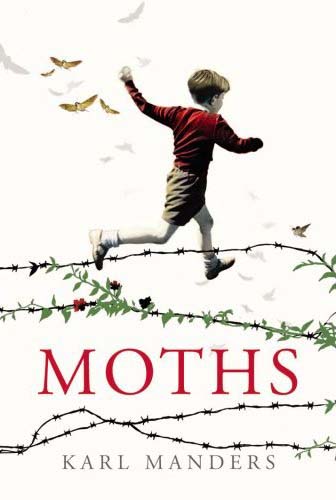
Moths by Karl Manders
The blurb on the back of this début novel describes it as 'a dazzling, potent novel about moths, running, jazz, the Siberian gulag, and seizing the moment'. This quirky list and the tone of it made me feel a little uneasy. At its heart however Moths is a novel about a Father and his son, but where other writers have dealt with the fraught relationships between them, Manders' places his two charcters miles apart leading separate lives through the tumult of 1930's Europe.
Cornelius Van Baerle, successful industrialist, sires a son whilst away on a business trip. He later returns with the boy and places him in the care of his childless sister in Gelderland, a Dutch province. Overjoyed at this answer to her prayers she exclaims 'He's a doll boy, so tiny and light. A doll boy'. And so Dolboy is named. Growing up in this rural idyll Dolboy develops a talent for running and whilst flying through the forests one day stumbles upon a summerhouse. He discovers the interior alive with hundreds of moths and it is here later that he meets Mirjam heir to the estate and the object of his affections as he grows up.
The war meanwhile has benefited Cornelius' business and he is pressured by the resistance to undertake a journey East once again to bear witness to the Nazi death camps and show his patriotism. It is journey which leads him to be captured by the liberating Red Army and eventually to the gulag.
The narrative continues on these two separate tracks and the image of parallel lines, train tracks and the question of whether the paths of Father and son will cross again is what keeps it moving forwards. The opening of the novel is a little confused but once Manders has established his rhythm it moves along with an almost fable like quality building momentum and emotive power. He is great when writing of Cornelius' experience as a member of the jazz band that keeps him safe from punishment and particularly strong when it comes to the lives of those in the gulag. I found myself wanting more of that than the growing pains of Dolboy but the two courses of the novel have an inevitability which culminates with powerful emotion.
A novel which ends better than it starts is a rare thing these days. Manders writing is enjoyable, atmospheric and builds well but it is the steady pounding of Dolboys footsteps rather than the vital beat of jazz that dictates the novel's rhythm
Thursday 6 September 2007
waiting for a bus
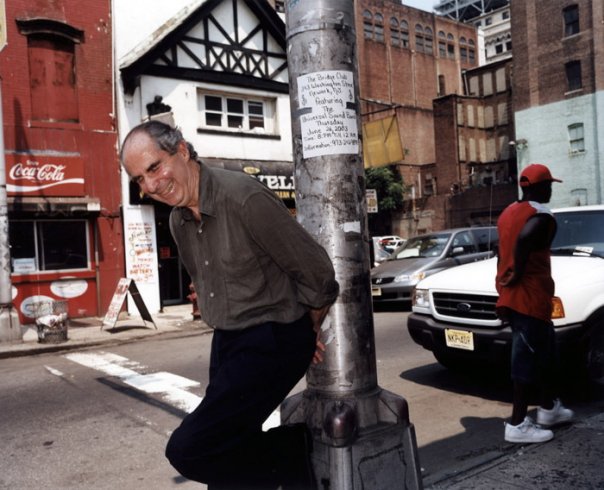
You know how it goes: you spend weeks/months not particularly enthused about what you're reading and then suddenly you realise that there's a bumper crop coming up.
I've just ordered a copy of Denis Johnson's new novel Tree of Smoke. His first novel in 9 years, it looks like a hefty tome and I can't wait. Johnson is an intriguing writer. A poet, playwright, journalist and novelist he often writes about those people at the margins, those underneath the surface of American society in particular. His novels aren't all consistent but I would recommend his first Angels, his most recent The Name of The World and his collection of stories Jesus' Son which was made into a good film by Alison Maclean starring Billy Cruddup, Jack Black and Samantha Morton.
Also soon to be published is the latest from Philip Roth. Exit Ghost looks to be the final novel featuring Roth's alter ego Nathan Zuckerman. I have always enjoyed reading Roth's work even if it doesn't all reach the heights of American Pastoral. His writing of late has been very much about the inexorable journey towards death and recent publicity shots have shown him looking, well, miserable as usual so I was cheered to see this interview recently and the picture above in particular.
Last but by no means least is Men In Space the new novel from Tom McCarthy. His first novel Remainder is quite simply the best book I have read this century (I know, it's early days). Brave, challenging and unique I urge you to read it now if you haven't already. This new book sounds very different and I had to stop myself mugging someone who was reading it on the bus yesterday.
Now that would be a headline:
Man mugged on bus for literary fiction
Saturday 1 September 2007
The National

I first saw The National on 'Later...with Jools Holland' a few years back. It was one of those late night experiences where you're not sure whether it's the wine but that last band sounded like the best thing since, well, Radiohead. My best friend had had a similar thought and went out to get the album. When he mentioned it to me a few days later it was like remembering something rather hazy, oh so they were as good as I thought.
That album Alligator is great. One of those albums which sounds good when you have the first listen and seems to get better every time you stick it back on the player. Passed around to a few friends it gets the 'oh this is great, who are they?' kind of response.
This year they released a new album Boxer which is fantastic too. The National are a deceptive band. Many people complained that Boxer was too similar to the previous album and on first listen it can appear that way but keep playing it and the subtleties start to appear. Matt Beringer's voice is deep, low and level but carries an emotional punch which sneaks up on you. The full texture of the band's playing is really evident with the headphones on but of course the real revelation is to see them live.
I was lucky enough to catch them at this years Latitude Festival in Suffolk. They almost didn't play because of a problem with their kit (it wasn't there) but with the help of Andrew Bird and The Cold War Kids the show went on. They played an excellent tight set which really lifted the crowd from lazy Sunday afternoon torpor and got things going before Arcade Fire came on and blew us all away. I won't talk about stand out tracks but just encourage you to go out, or online, now and buy both Alligator and Boxer. Now. Below is the track that got it all started and the one that made me very happy in Suffolk. Press play and enjoy.
The National - Cherry Tree
The National - Apartment Story


